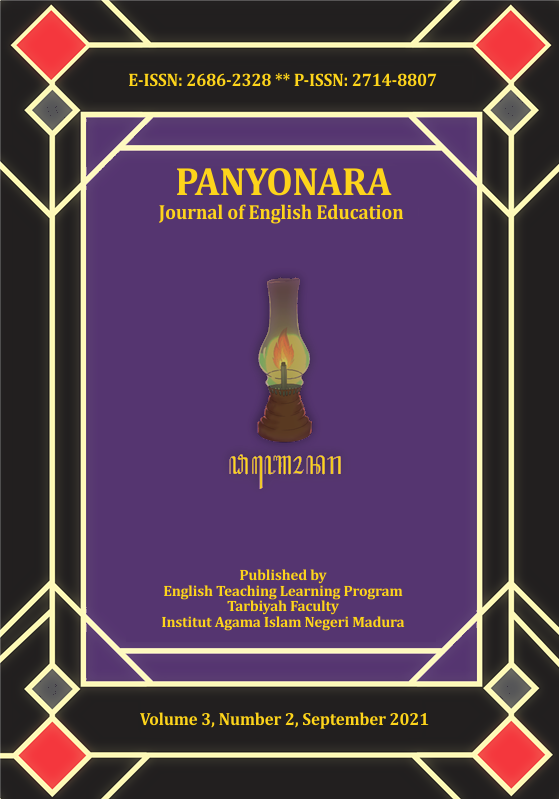Indonesian EFL Students’ Perceptions on Learning Autonomy in Online Learning Delivery Mode
 Abstract views: 651
,
Abstract views: 651
,
 PDF downloads: 631
PDF downloads: 631
Abstract
The online learning delivery method is increasingly used in the teaching and learning process at universities. This type of learning is relatively new to students, in particular to Indonesian EFL students. Students' learning autonomy in an online learning system is inevitably required. Autonomy in online learning and in offline learning can be differently perceived by the students. This study aimed at revealing EFL students' perception on learning autonomy in an online learning method. A questionnaire was used as the single instrument to obtain data from 35 students of the English Education Study Program of Tarbiyah and Teacher Education Faculty, State Islamic University Raden Fatah Palembang. The study sample was selected using opportunity sampling, and data were analyzed using a simple percentage statistic formula. The study results indicated that the majority of the students perceive online learning as independent learning in which they must have self-learning awareness and motivation, self-learning responsibility, and self-directed and governed learning. They also perceived that they could develop the problem-solving ability, critical thinking, and learning initiative in autonomous online learning. In the context of learning independently in an online learning system, self-time management is also essential to support their learning optimally.
Downloads
References
Ally, M. (2004). Foundations of Educational Theory for Online Learning. In T. Anderson & F. Elloumi (Eds.), Theory and Practice of Online Learning. Athabasca: Athabasca University.
Bakia, M., Shear, L., Toyama, Y., & Lassete, A. (2012). Understanding the Implications of Online Learning for Educational Productivity. Center for Technology in Learning SRI International. https://tech.ed.gov/files/2013/10/implications-online-learning.pdf
Baliyan, S., & Moorad, F. (2018). Teaching Effectiveness in Private Higher Education Institutions in Botswana: Analysis of Students’ Perceptions. International Journal of Higher Education, 7(3), 143–155. https://doi.org/10.5430/ijhe.v7n3p143
Beatty, K. (2003). Teaching and Researching Computer-Assisted Language Learning. London: Pearson Education.
Benson, P. (2001). Teaching and Researching Autonomy in Language Learning. London: Longman.
Binn, K. (2020). The Benefits of Autonomous Learning. http://somervilleacademy.com/the-benefits-of-autonomous-learning/
Bravo, J. C. (2017). Motivation and Autonomy in Learning English as Foreign Language: A Case Study of Ecuadorian College Students. English Language Teaching, 10(2. 10.5539/elt.v10n2p100
Broadbent, J., & Poon, W. (2015). Self-Regulated Learning Strategies & Academic Achievement in Online Higher Education Learning Environments: A Systematic Review. The Internet and Higher Education, 27, 1–13. https://doi.org/10.1016/j.iheduc.2015.04.007
Dornyei, Z. (2007). Research Methods in Applied Linguistics. Oxford: Oxford University Press.
Dornyei, Z. (2010). Questionnaires in Second Language Research: Construction, Administration, and Processing. London: Routledge.
Gottardi, M. de L. (2015). Autonomy in the Learning Process at a Distance: The Competence to be Developed by the Student. Associação Brasileira de Educação a Distância, 14, 108–110.
Khan, M. A., Vivek, V., Nabi, M. K., Khojah, M., & Tahir, M. (2020). Students’ Perception towards E-Learning during COVID-19 Pandemic in India: An Empirical Study. Sustainability, 13(1), 1–14. https://doi.org/10.3390/su13010057
Khotimah, K., Widiati, U., Mustofa, M., & Ubaidillah, M. F. (2019). Autonomous English learning: Teachers’ and students’ perceptions. Indonesian Journal of Applied Linguistics, 9(2), 371–381. https://doi.org/10.17509/ijal.v9i2.20234
Lee, E., Pate, J. A., & Cozart, D. (2015). Autonomy Support for Online Students. TechTrends, 59(4), 54–61. https://doi.org/10.1007/s11528-015-0871-9
Lengkanawati, N. S. (2017). Learner Autonomy in The Indonesian EFL Settings. Indonesian Journal of Applied Linguistics, Vol. 6 No. 2, 222–231.
Liu, H. ju. (2015). Learner Autonomy: The Role of Motivation in Foreign Language Learning. Journal of Language Teaching and Research, Vol. 6, No. 6, 1165–1174.
McDonald, S. M. (2012). Perception: A Concept Analysis. International Journal of Nursing Knowledge, 23(1), 2–9. https://doi.org/10.1111/j.2047-3095.2011.01198.x
Najeeb, S. (2013). Learner Autonomy in Language Learning. Procedia - Social and Behavioral Sciences, 70, 1238–1242. doi: 10.1016/j.sbspro.2013.01.183
Padmo, D., Belawati, T., Idrus, O., & Ardiasih, L. S. (2017). The State of Practice of Mobile Learning in Universitas Terbuka Indonesia. In A. Murphy, H. Farley, L. E. Dyson, & H. Jones (Eds.), Mobile Learning in Higher Education in the Asia-Pacific Region 40, 173–190. Springer Singapore. https://doi.org/10.1007/978-981-10-4944-6_9
Purwadi, Saputra*, W. N. E., Wahyudi, A., Supriyanto, A., Muyana, S., Rohmadheny, P. S., … Kurniawan, S. J. (2021). Student Perceptions of Online Learning during the COVID-19 Pandemic in Indonesia: A Study of Phenomenology. European Journal of Educational Research, 10(3), 1515–1528.
Simmons, D. E. (2012). The Forum Report: E-Learning Adoption Rates and Barriers. New York: McGraw-Hill.
Song, L., & Hill, J. (2007). A Conceptual Model for Understanding Self-Directed Learning in Online Environments. Journal of Interactive Online Learning, 6(1), 27–42.
Stack, S. (2015). Learning Outcomes in an Online vs. Traditional Course. International Journal for the Scholarship of Teaching and Learning, 9(1), 1–18. https://doi.org/10.20429/ijsotl.2015.090105
Wojciechowska, A. T. (2015). The Use of the Internet in Developing Learner’s Autonomy. World Scientific News, 8, 54–81.
Tuchfah, F. N. (2019). Teachers’ and Students’ Perception of Learner Autonomy in Language Learning at SMAN I Gedangan Sidoarjo [Undergraduate Thesis, UIN Sunan Ampel Surabaya].
Ustunluaglu, E. (2009). Autonomy in Language Learning: Do Students Take Responsibility for Their Learning? Journal of Theory and Practice in Education, 5 (2), 148–169.
Walter, E., & Woodford, K. (2010). Cambridge Advanced Learner’s Dictionary. Cambridge: Cambridge University Press.
The journal uses an Open Access policy under a Creative Commons Attribution-NonCommercial 4.0 International License. Authors who publish with this journal agree to the following terms:
- Authors retain copyright and grant the journal right of first publication with the work simultaneously licensed under a Creative Commons Attribution License that allows others to share the work with an acknowledgment of the work's authorship and initial publication in this journal.
- Authors are able to enter into separate, additional contractual arrangements for the non-exclusive distribution of the journal's published version of the work (e.g., post it to an institutional repository or publish it in a book), with an acknowledgment of its initial publication in this journal.
- Authors are permitted and encouraged to post their work online (e.g., in institutional repositories or on their website) prior to and during the submission process, as it can lead to productive exchanges, as well as earlier and greater citation of published work.
















